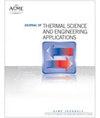Numerical investigation of the heat transfer characteristics of liquid lithium metal in spiral tubes
IF 1.4
4区 工程技术
Q3 ENGINEERING, MECHANICAL
引用次数: 0
Abstract
Abstract The application of liquid lithium as a coolant for the forthcoming era of space nuclear reactors exhibits significant potential, and spiral tube heat exchanger components are commonly used in steam generators for reactors. However, the heat transfer characteristics of liquid lithium in spiral tubes are not yet fully understood. This research establishes a non-isothermal heat transfer model incorporating a modified turbulent Prandtl number to analyze the flow of liquid lithium through spiral tubes with varying geometries. Numerical analysis is carried out focusing on the influence of inlet velocity, the distribution of related parameters, and the geometry of spiral tubes. The results demonstrate that in the range of the dimensionless Dean number 8165–13,063, the Nusselt number and the pressure drop present approximately linear relations with the Dean number. For the distribution law of relevant physical quantities, the inner side of the tube displays an eye-anatomy low-flowrate area and a high-temperature area, while a low-pressure area forms on the inner pipe wall. Finally, the pitch and spiral radius are found to be reduced as much as possible to ensure high liquid lithium-based heat transfer performance with a small pressure drop. The optimized design parameters reveal that within the actual design range of non-dimensional pitch of 0.667–10.667 and curvature of 0.0556–0.1667, the non-dimensional pitch and curvature are 0.667–2.667 and 0.1667, respectively. This study offers valuable insights into the heat transfer properties of liquid lithium within heat exchangers of the spiral tube design, promoting its application in space nuclear reactor power supply.液态锂金属在螺旋管内传热特性的数值研究
摘要在即将到来的空间核反应堆时代,液态锂作为冷却剂的应用显示出巨大的潜力,螺旋管换热器组件是反应堆蒸汽发生器中常用的部件。然而,液态锂在螺旋管内的传热特性尚不完全清楚。本文建立了一个包含修正湍流普朗特数的非等温传热模型,分析了液态锂在不同几何形状螺旋管内的流动。数值分析了进口速度、相关参数的分布以及螺旋管的几何形状对其性能的影响。结果表明:在无量纲Dean数8165 ~ 13063范围内,Nusselt数和压降与Dean数呈近似线性关系;从相关物理量的分布规律来看,管内呈现眼解剖低流量区和高温区,管内壁形成低压区。最后,尽可能地减小螺距和螺旋半径,以保证在小压降下高的液态锂基传热性能。优化后的设计参数表明,在无量纲节距0.667 ~ 10.667、曲率0.0556 ~ 0.1667的实际设计范围内,无量纲节距为0.667 ~ 2.667,曲率为0.1667。本研究对螺旋管式换热器内液态锂的传热特性研究具有重要意义,可促进其在空间核反应堆电源中的应用。
本文章由计算机程序翻译,如有差异,请以英文原文为准。
求助全文
约1分钟内获得全文
求助全文
来源期刊

Journal of Thermal Science and Engineering Applications
THERMODYNAMICSENGINEERING, MECHANICAL -ENGINEERING, MECHANICAL
CiteScore
3.60
自引率
9.50%
发文量
120
期刊介绍:
Applications in: Aerospace systems; Gas turbines; Biotechnology; Defense systems; Electronic and photonic equipment; Energy systems; Manufacturing; Refrigeration and air conditioning; Homeland security systems; Micro- and nanoscale devices; Petrochemical processing; Medical systems; Energy efficiency; Sustainability; Solar systems; Combustion systems
 求助内容:
求助内容: 应助结果提醒方式:
应助结果提醒方式:


